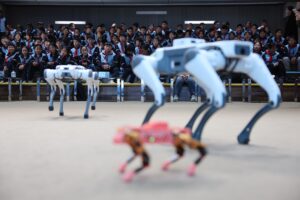
Artificial intelligence (AI) is no longer confined to science and engineering. It has become a general education subject for students across disciplines.
In 2023, China’s Ministry of Education laid out a plan for optimizing emerging disciplines by 2025, in a quest to keep in touch with new technologies, emerging sectors and new business modes.
The recent government work report also emphasizes efforts to expand quality undergraduate education and accelerate the development of world-class universities and academic disciplines.
Accordingly, leading Chinese universities such as Tsinghua University, Wuhan University and Shanghai Jiao Tong University have announced plans to expand their enrollments in AI and related interdisciplinary fields to meet growing demand.
Medicine is one of the most closely integrated disciplines. Over 20 AI-related courses are currently offered by Shanghai Medical College of Fudan University. These courses cover fundamental computer theories as well as real-world applications. One such course is “Deep Learning in Medical Imaging.” The teaching team for this course consists of professors with backgrounds in biomedical engineering, who deeply understand the importance of interdisciplinary collaboration.
Chinese universities place a strong emphasis on collaborating with businesses and industries in addition to improving AI education. For instance, Nanjing University in east China’s Jiangsu Province has worked closely with leading tech enterprises, such as Baidu and Huawei, to jointly develop intelligent tools that support AI-based teaching and assessment.
Chengdu-based Southwest Jiaotong University in southwest China’s Sichuan Province, meanwhile, has partnered with Amazon, JD.com and other companies in designing AI courses to enhance the practical skills of students. The university has also established a training system for top-tier AI talent, spanning undergraduate to doctoral levels.
China’s long-term vision for education was reinforced in January with the unveiling of a master plan concerning building the country into a leading nation in terms of education by 2035.
On March 19, 2024, a primary school in Jinan City, Shandong Province, east China, hosts a robotics science event. /VCG
On March 19, 2024, a primary school in Jinan City, Shandong Province, east China, hosts a robotics science event. /VCG
“DeepSeek and robotics represent China’s achievements in technological innovation and talent cultivation, while also placing new demands on our education development and talent training,” said China’s Minister of Education Huai Jinpeng.
The need is clear – job postings for drone engineers, algorithm engineers and machine learning positions saw a year-on-year increase of about 40 percent in February, according to a survey by Zhaopin, an online recruitment platform in China. Industry reports indicate that by 2030, China is likely to face a shortage of 4 million AI professionals.
Experts believe that fostering collaboration between universities and enterprises is key to bridging the gap between talent development levels and enterprise needs – while also enhancing university research via enterprise technology.
“Higher education in any country is a valuable resource for national strategy,” Huai said, adding that more efforts will be made to incorporate key fields, such as AI and biotechnology, to better align with national strategies and technological development.

